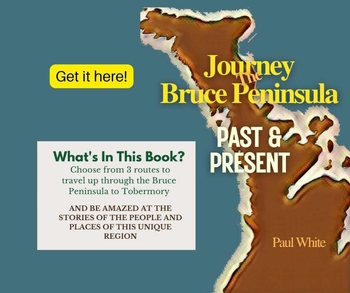The Glorious Twelfth: A Tradition from Across the Pond
The Glorious Twelfth: A Tradition from Across the Pond which served to both unite and divide pioneer communities.
The 12th of July was a time for celebration in many parts of Grey and Bruce counties. However, today this celebration is but a shadow of its former self. In fact, many people do not even know what the significance of this date in history is.
The "Glorious Twelfth" celebrated the victory of William of Orange at the Battle of the Boyne. When James the Second ascended the throne of England, he attempted to restore Catholicism in England. This made him unpopular with many of his subjects. Therefore, the English parliament called upon his cousin, William of Orange, to replace James as King.
As a result of this parliamentary action, a war ensued, and the final battle was fought at the Boyne River in Ireland on July 12, 1690. The victory by William re-established a Protestant monarch in England and supported the rule of the land barons in England. Perhaps more than anything else the entrenchment of Protestant rule, represented by the wealthy land owners in Ireland, widened the gulf between the Protestants and Catholics in that country. What began as an economic issue, concerning land ownership spiraled downward into the trough of the sectarian violence which still plagues the country.
In 1795 the Orange Society was formed in Ireland to protect Protestantism. This sense of sectarianism remained when thousands of Irish settlers, came to Canada. Even in the Grey and Bruce region, an examination of settlement records shows the Catholics and Protestants settled in distinct geographical regions. Like so many other traditions from the homeland the Loyal Order of the Orange Lodge established itself in Canada.
Although many tales of sectarian disagreements between the Protestants and the Catholics can be found in Canadian history, none could be considered to be widespread in scope and, fortunately they are now largely non-existent.
Fortunately, the festivities surrounding the “Glorious Twelfth” marked more of an occasion for a respite from the hard life of the early settlers than a political statement. Farmers worked hard to get their hay in before the 12th of July. Their wives and daughters spent long hours preparing for the festivities that would be held in conjunction with the celebration of the Battle of the Boyne.
Early newspapers advertised excursions to nearby towns for special events. On the morning of the celebrations the Protestant settlers arose earlier than usual to get their daily chores completed. Then the family packed up their picnic lunches and dressed in their best clothes and headed to the community where the July 12th festivities were being held.
The first item on the day's agenda was a parade. All of the members of the Orange Lodge marched. At the head of the parade, one member of the lodge rode a white horse. He was emblematic of William leading his troops to battle at the River Boyne. The parade usually ended at or near the site of the day's festivities. Tables were spread with the bounty of the harvests from the settlers' daily toils. Games were held. Quite often there were competitions between teams from the various lodges and communities in attendance. Most notable of all at many of the celebrations was a lack of political and religious commentary! The day did not seem to be about anything more than a celebration of family and friendship.
The Orange Lodge served many functions in pioneer society in this region. But most of all, it was an association which provided friendship and support for many settlers striving to build a new life in a new homeland. Fortunately, most people on both sides in this century’s old sectarian strife left their differences behind them when they boarded the ships bound for Canada.
History Pages
Baseball History in Southwestern Ontario is rich, and surprisingly longer than one might expect, actually setting historical precedents!
Census Takers in 1891 Canada faced difficult obstacles to gather the necessary information but the results were revealing then, and today.
The Glorious Twelfth: A Tradition from Across the Pond which served to both unite and divide pioneer communities.
Maple Syrup: A Pioneer Necessity and a trading commodity for indigenous peoples is now a Sunday morning breakfast treat with pancakes!
Paris Ontario: Who Knew this community had such a unique origin and how the local citizens used that history to protect the environment of their region?
Pioneer Christmas: A Family Tradition as told to me by may grandparents who experienced Christmas as children in the 1880s and 1890s.
"Thank You to a Veteran" - should be something everyone of us should think, and especially say, every day!
From Lochnaw to Manitoulin - A Review this book details through a soldier's diary a trip from Penetanguishene to Manitoulin Island in 1839.
Baseball History in southwestern Ontario has very early beginnings and the dominance of Canadian teams in early competition may be surprising to many readers.
History Pages introduces the readers to interesting people, places, and events that I have researched and written about in my writing career that spans more than three decades.





